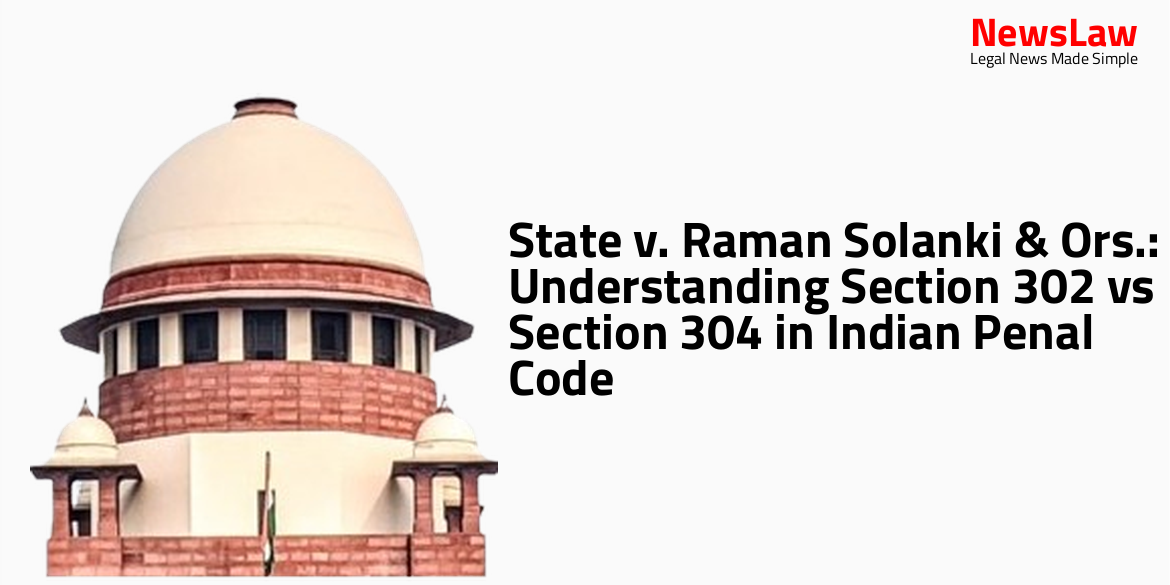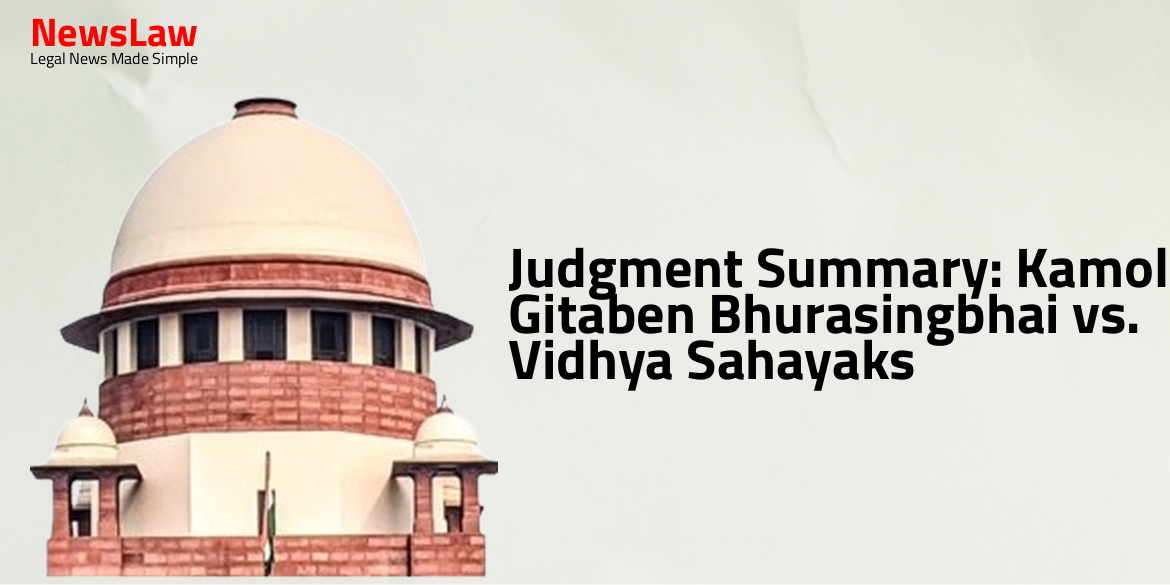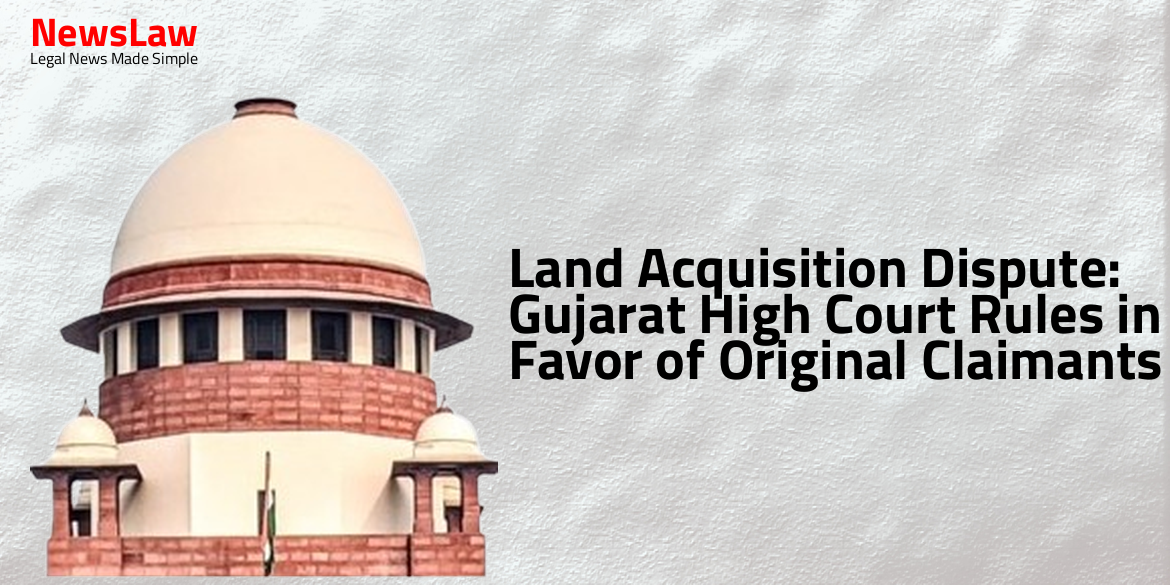The Gujarat High Court recently ruled on the case of State v. Raman Solanki & Ors., providing clarity on the application of Section 302 versus Section 304 in the Indian Penal Code. The judgment delves into the crucial aspect of intention to determine the appropriate section to apply. Stay tuned to understand the legal nuances involved in this significant case.
Facts
- The trial Court convicted the accused under Section 304 Part-1 and II, not under Section 302 of the Indian Penal Code.
- Raman Solanki was found guilty under Section 304 Part-II, Section 323 read with Section 34 of the IPC and sentenced to 5 years RI and a fine.
- Dariaben Ramanbhai was found guilty under Section 304 Part-I, Section 323 of the IPC and sentenced to 3 months RI and a fine.
- Pasabhai Manibhai was found guilty under Section 304 Part-II, Section 323 of the IPC and sentenced to 5 years RI and a fine.
- The State appealed against the acquittal under Section 302 of the IPC.
- Charges were framed against the accused on 4.5.1994 for the mentioned offences.
- Accused Raman Solanki, Pasabhai Solanki, and Dariaben Solanki went to the deceased’s house to obtain consent for mortgage, leading to a fatal altercation.
- Witness Shantaben sustained injuries while trying to rescue her husband during the incident.
- The accused denied the prosecution’s evidence, claiming they were falsely implicated due to a family dispute.
- The deceased was killed by unknown persons according to the accused.
- The weapons used in the offense were seized and recovered post the complaint by the injured eyewitness Shantaben.
- Accused No.1 Raman Solanki caused injuries to the deceased’s legs with a spear, while accused No.2 Pasa Solanki struck the head with a shovel and accused Dariaben used a wooden log on both the deceased and witness Shantaben.
- The witness Maniben PW-3 claimed to have witnessed the incident and her involvement led to abatement of the appeal against her.
- Accused were charge-sheeted post completion of the investigation for the mentioned offenses.
Arguments
- The Additional Public Prosecutor is appealing the judgment and order of acquittal under Section 302.
- The acquittal findings are deemed contrary to the evidence and law on record.
- The judgment of acquittal is argued to be based on irrelevant material and is perceived to suffer from patent perversity.
- The act in question is alleged to have been done with the intention of causing death, given the role played by the accused and the nature of injuries inflicted.
- The Additional Public Prosecutor asserts that the trial court correctly relied on the testimonies of eye-witnesses.
- The respondents argue that based on the evidence on record, the trial Court’s decision was justified in convicting the accused under Section 304 Part-I and II of the IPC instead of Section 302.
- They claim that the incident leading to the deceased’s death was sudden and without premeditation, stemming from a dispute where the deceased refused to cooperate with the accused in obtaining a loan.
- The two key eyewitnesses, Shantaben PW-2 and Maniben PW-3 Exh-15, supported the prosecution’s case, leading the trial Court to convict the accused under Section 304 Part-I and II of the IPC.
- The cause of death, as per the medical officer, was due to shock and hemorrhage from multiple injuries found on the deceased’s body.
- The respondents argue that the accused did not have the intention to cause the injuries that led to the deceased’s death, as confirmed by the nature of the injuries, weapon used, and the circumstances surrounding the event.
- The experts argue that based on the evidence and the state of mind of the accused, the act should be deemed as culpable homicide not amounting to murder.
- Referring to a relevant Supreme Court case, it is noted that there is a distinct difference between culpable homicide and murder, primarily based on the degree of intention and knowledge involved.
- The Additional Public Prosecutor asserts that the accused does not fall under any exception under Section 300 of the Indian Penal Code, indicating that the act does not amount to murder under the law.
Analysis
- In the case of Pulicherla Nagaraju v. State of M.P, (2006) 11 SCC 444, the court illustrated how to determine if a case falls under Section 302 or Section 304 Part I/II.
- The Court must consider the evidence and circumstances to make the determination.
- The distinction between murder (Section 302) and culpable homicide not amounting to murder (Section 304 Part I/II) depends on the intention and knowledge of the accused.
- The nature of the act, the weapons used, the injury inflicted, and the conduct of the accused are essential factors for the Court to consider.
- The Court must assess the evidence to ascertain if the act was done with the intention of causing death or with the knowledge that it is likely to cause death.
- Courts must ensure cases of murder under section 302 are not converted to offences under section 304 Part I or Part II
- Cases of culpable homicide not amounting to murder must be treated as murder punishable under section 302
- Courts must determine the crucial aspect of intention to decide the appropriate section to apply
- Cases where accused claim no intention to cause death should be carefully analyzed
- Intention is pivotal in deciding if a case falls under Section 302, 304 Part I, or 304 Part II
- Minor incidents like plucking fruit or quarrels escalating into group clashes resulting in deaths should be handled judiciously
- Motives like revenge, greed, jealousy may be absent in such cases
- Criminality may not even be present in certain situations
- Nature of the weapon used
- Whether the blow is aimed at a vital part of the body
- The amount of force employed in causing injury
- Whether the incident occurs by chance or premeditation
- Whether there was any prior enmity or the deceased was a stranger
- Whether there was any grave and sudden provocation and its cause
- Whether it was in the heat of passion
- Whether the accused took undue advantage or acted cruelly
- Whether the accused dealt a single blow or several blows
- The findings of the trial court regarding not convicting the accused under Section 302 were not found to be perverse.
- The conclusion to convict the accused under Section 304 Part I and II of the IPC is in line with statutory provisions and evidence on record.
- There are no substantial reasons to alter the trial court’s findings, hence the appeal is dismissed.
Decision
- Bail bond, if any, stands cancelled.
- Surety, if any given, stands discharged.
- R&P to be sent back to the trial Court.
Case Title: STATE OF GUJARAT Vs. RAMANBHAI MANIBHAI SOLANKI
Case Number: R/CR.A/469/1995



